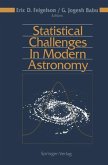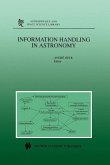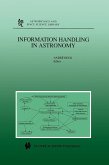Data archiving has, for many years, been the most disregarded aspect of all data systems. The increase in numbers of telescopes, both groundbased and space-borne, and the increase in efficiency of detectors have generated overwhelming amounts of data. Much of these data were and are not used on short timescales and (should) have been archived, where they can be used later and/or by others. Archiving is essential. Objects can change in the course of time. New technological or scientific developments might require observing objects again. The cost-benefit ratio will become more and more important when considering the allocation of telescope time. The retrieval of `old' data can then be crucial.
At present there are a number of data collections and data retrieval systems. This book includes a series of clear and up-to-date descriptions of many important available data systems.
For professional astronomers, librarians and computer engineers.
Hinweis: Dieser Artikel kann nur an eine deutsche Lieferadresse ausgeliefert werden.
At present there are a number of data collections and data retrieval systems. This book includes a series of clear and up-to-date descriptions of many important available data systems.
For professional astronomers, librarians and computer engineers.
Hinweis: Dieser Artikel kann nur an eine deutsche Lieferadresse ausgeliefert werden.
` The book is a reference work, useful and probably a must for the astronomer wanting to use archived data. It should be in the library of each astronomical research institute. '
Space Science Reviews, 62:393
Space Science Reviews, 62:393
` The book is a reference work, useful and probably a must for the astronomer wanting to use archived data. It should be in the library of each astronomical research institute. ' Space Science Reviews, 62:393








